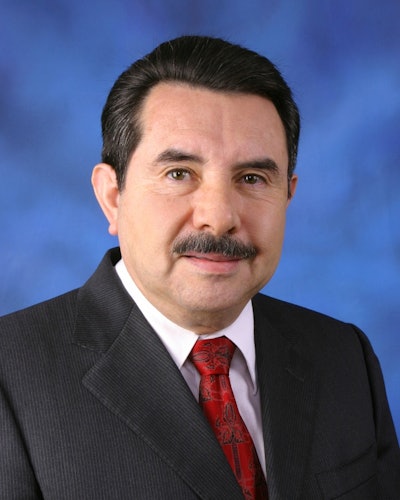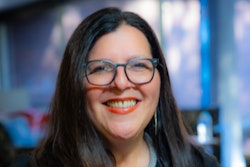 Dr. Antonio Flores, president and CEO of HACU
Dr. Antonio Flores, president and CEO of HACU
Flores, CEO and president of HACU, said he hopes to convince congress to quadruple promised federal funds and create a capital financing program, similar to the kind used by Historically Black Colleges and Universities (HBCUs).
“Creating an Hispanic-serving Institution (HSI) capital financing program will provide the necessary funding via federal funds required to subsidize minimal interest rates for HSIs,” said Flores.
Running through Wednesday, attendees of the all-virtual 35th annual conference will have over 50 opportunities to learn and engage with techniques and methods that support the wellness and success of Latinx students, faculty, staff, and Hispanic-Serving Institutions (HSIs).
“HACU and HSIs continue to be the backbone of Hispanic success,” said Flores, who has served as HACU's president for 25 years.
To become an HSI, an institution must serve a student population that is at least 25% Latinx. In 2010, there were 311 registered HSIs in the U.S.; in 2020, the number reached 539. That exponential growth is expected to continue.
“HACU membership increased by 23% since 2010,” said Flores. “Our goal is to get every HSI to join HACU to advocate for equitable federal funding and new programs to enhance Hispanic student success across the nation.”
Only 22% of Hispanic workers have a bachelor’s degree or higher, and 10% have an associate degree, said Flores.
“They are the least educated segment of the work force, but more than half of workers joining the force right now are Hispanic. In order for America to remain competitive, funding for HSIs is necessary,” he added.
HACU has worked with several federal agencies to create partnership, funding, and internship opportunities. One of their latest successes is a partnership called Grow with Google, and an HSI career readiness program that will launch soon at six institutions across the nation. Google’s end goal is to directly serve 200,000 students in four years.
The conference paid special notice to the disproportionate impact of COVID-19 on the Latinx community. COVID “shrunk, by more than three years, the Hispanic life expectancy,” said Flores. “HSIs educate those underserved students and operate as community centers for families and neighborhoods to mitigate the impact of COVID on the area.”
Two workshops held during the first day of the conference, shared tips on improving student success metrics for HSIs or any institution looking to better serve its Hispanic population. Dr. Sheila Bauer-Gatsos, an associate professor of English at Dominican University, spoke about the switch Dominican made in 2015 to “holistic advising,” which “has proven scalable, adaptable and, most importantly, shown to have an impact on retention and completion.”
Dominican is an HSI, with 49.2% of its enrollment in fall 2020 identifying as Latinx. This style of advising provides equitable interventions at the right time, getting students back on track with the mindset for completion.
 Dr. Sheila Bauer-Gatsos
Dr. Sheila Bauer-Gatsos
That initiative was given the name First Year Experience (FYE), and in fall 2020, FYE was fully integrated as one third of the first seminar’s academic content required for all entering students.
Dr. Mark Carbonara, director of advising and FYE advising and student development at Dominican, said the creation of the FTE follows the arc of student development. His team conducts regular surveys and research on best practices.
“Our surveys allow us to see where [students] started, went, and how we can get them to finish strong,” said Carbonara.
The FTE seminar focuses on the following areas: unfamiliarity with higher education, what students can control, how to learn in college, how to use time effectively, how to receive feedback, how to take care of one's mental health, and financial literacy courses. Students are also given a chance to speak with every program offered on Dominican’s campus and are acquainted with the many resources Dominican has to offer.
Faculty and staff meet two to three times per semester to discuss curricular elements, share resources, troubleshoot, and participate in inclusive pedagogy course, “followed up with workshops to move from theory to practice,” said Bauer-Gatsos. “All of this allowed us to support faculty as they adapted their teaching and advising to better support student success.”
Dominican also created a system of peer supports, trained students, usually a year or two older than their tutees, who are embedded in each classroom and to help a student there in the moment before a struggle begins.
After the pandemic began, Dominican began supplementing its mental and physical health services with bereavement support.
“We provide students the chance to self-refer and let us know what they might need from us, so we can help them in real time," said Dr. Tina Taylor Ritzler, a professor of psychology at Dominican.
Three surveys are sent out to the students in the third, eighth, and fourteenth week of classes, weighted as assignments to incentivize student completion. The surveys ask students about a number of factors that are critical to educational success: do you have a place to live? Do you have enough to eat? Have you been able to pay for all the textbooks you need?
Students respond with a simplified code: a green, yellow, or red light, like a traffic sign. Students who select green indicate they are doing well; yellow indicates concern; red means the student needs help.
“This is a triage effort to meet students where they are,” said Taylor-Ritzler. “To promote student engagement and belonging before they experience crisis.”
In the past year, 3,000 alerts have been submitted; with only about 3,000 students on campus, Taylor-Ritzler said this system is working to address student needs.
At the University of Tennessee, Knoxville, clinical associate professor Dr. Lisa Zottarelli helps institutions assess the success of the supports put in place to address basic needs, like lack of housing or food insecurity. Basic Needs Initiatives, or BNIs, are programs or services like food pantries, mental or physical health services, travel needs, emergency funding, or childcare support.
In order to assess, finetune, and improve BNIs, institutions should develop a logic model, evaluation model, and evaluation plan examining the impacts of a specific BNI resource to student success. It’s important, said Zottarelli, that institutions select a BNI for analysis that has been operating for a while, with established delivery and outcome variables. For many institutions, the first BNI to be assessed is the food pantry.
Proper comparison is made by comparing educational outcomes with students who do not use a BNI resource. Institutions need to identify those characteristics, said Zottarelli, to ensure results don’t confuse correlation with causation.
Once an institution has completed a study of its success and created the report of its findings, Zottarelli said it’s important for the cycle of BNI review to begin again, so institutions can continue to learn how to improve their support structures for at risk students.
Liann Herder can be reached at [email protected].



















